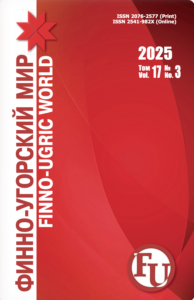-
ISSN 2076-2577 (print)
ISSN 2541-982X (online)
Registry Entry ПИ № ФС77–70644 August 3, 2017 
Archives
Tag Archives: 2018-01
Contents (2018, 1)
PHILOLOGY O. N. Bazhenova (Syktyvkar, Russia). The Abstract Nouns in the Poetry by Ivan Kuratov I. G. Antonov, S. V. Sheianova, E. A. Sharonova (Saransk, Russia). Mordovian fairy tales as a means of ethno-cultural development of the personality A. P. … Continue reading
O. N. Bazhenova (Syktyvkar, Russia). The Abstract Nouns in the Poetry by Ivan Kuratov
DOI 10.15507/2076-2577.010.2018.01.006-017 The Abstract Nouns in the Poetry by Ivan Kuratov Olga N. Bazhenova, Postgraduate student, Institute of Language, Literature and History, Komi Research Center, Ural Branch of the Russian Academy of Sciences (Syktyvkar, Russia), bazhenova-olga2011@mail.ru The paper deals the … Continue reading
N. F. Belyaeva (Saransk, Russia). Moksha rural household in modernization processes
DOI 10.15507/2076-2577.010.2018.01.075-088 Moksha rural household in modernization processes Nadezhda F. Belyaeva, Doctor of Historical Sciences, Professor, Department of National and Foreign history, M. E. Evseyev Mordovia State Pedagogical Institute (Saransk, Russia), yaushkina87@mail.ru Transformation of rural communities of Moksha rural household, its role … Continue reading
E. A. Tsypanov (Syktyvkar, Russia). Suffixoid -poz in the composition of peerative lexis of the Komi language
DOI 10.15507/2076-2577.010.2018.01.052-061 Suffixoid -poz in the composition of peerative lexis of the Komi language Evgenii A. Tsypanov, Doctor of Philology, Associate Professor, Deputy Director, Institute of Language, Literature and History of the Komi Scientific Center, Ural Branch of the Russian … Continue reading
A. P. Guskova (Moscow, Russia). The grammer of the Hungarian language etiquette (in the Hungarian language textbooks)
DOI 10.15507/2076-2577.010.2018.01.029-035 The grammer of the Hungarian language etiquette (in the Hungarian language textbooks) Antonina P. Guskova, Candidate Sc. {Philology}, Associate Professor, Department of Finno-Ugric Philology, Lomonosov Moscow State University (Moscow, Russia), guskova_ant@mail.ru Features of Finno-Ugric languages’ (including Hungarian) are … Continue reading
O. V. Filippova (Saransk, Russia). Models of communicative conduct in Mordovian paramias: lingua-pragmatic and lingvocultural aspects
DOI 10.15507/2076-2577.010.2018.01.041-051 Models of communicative conduct in Mordovian paramias: lingua-pragmatic and lingvocultural aspects Olga V. Filippova, Doctor of Pedagogy, Professor, Department of Russian as Foreign Language, Ogarev Mordovia State University (Saransk, Russia), filippovaov@mail.ru The article considers Mordovian paremia for effective … Continue reading
N. A. Rakin (Syktyvkar, Russia). Estonian literature in the komi language
DOI 10.15507/2076-2577.010.2018.01.036-040 Estonian literature in the komi language Nikolay A. Rakin, Doctor of Philosophy (PhD), Research Fellow, Institute of Language, Literature and History, Komi Research Center, Ural Branch of Russian Academy of Sciences (Syktyvkar, Russia), nikrakin@yahoo.com The article discusses Komi … Continue reading
I. G. Antonov, S. V. Sheianova, E. A. Sharonova (Saransk, Russia). Mordovian fairy tales as a means of ethno-cultural development of the personality
DOI 10.15507/2076-2577.010.2018.01.018-028 Mordovian fairy tales as a means of ethno-cultural development of the personality Iurii G. Antonov, Doctor of Philology, Head of the Department of Finno-Ugric Literature, Ogarev Mordovia State University (Saransk, Russia), antonovug@yandex.ru Svetlana V. Sheianova, Doctor of Philology, … Continue reading
I. V. Bakhlov, О. V. BakhlovA (Saransk, Russia). Russian-Hungarian relations: the stages of evolution
DOI 10.15507/2076-2577.010.2018.01.062-074 Russian-Hungarian relations: the stages of evolution Igor V. Bakhlov, Doctor of Political Science, Head of the Department of General history, Political Science and Area Studies, Ogarev Mordovia State University (Saransk, Russia), bahlov@mail.ru Olga V. Bakhlova, Doctor of Political … Continue reading
V. M. Umorina (Saransk, Russia). Finno-Ugric Skansen in Russia: cultural potential and tourist resource
DOI 10.15507/2076-2577.010.2018.01.094-109 Finno-Ugric Skansen in Russia: cultural potential and tourist resource Viktoriia M. Umorina, Postgraduate student, Department of Architecture and Design, Ogarev Mordovia State University (Saransk, Russia), mikhailova.victoria1990@yandex.ru The author puts the problem of the development of skansens (open-air museums) … Continue reading
V. I. Rogachev, A. S. Luzgin (Saransk, Russia). Where does the homeland begin?
Where does the homeland begin? Alexander S. Luzgin, Doctor of History, Chairperson of Executive Committee of Interregional Public Organization of Mordovian (Moksha and Erzya) People (Saransk, Russia), mordvarf@mail.ru Vladimir I. Rogachev, Doctor of Philology, Professor, Department of Literature and Methods … Continue reading
E. V. Ostapova (Syktyvkar, Russia). “The attraction of the North: language, literature, community”
“The attraction of the North: language, literature, community” Elena V. Ostapova, Candidate Sc. {Philology}, Docent, Pitirim Sorokin Syktyvkar State University (Syktyvkar, Russia), ost-1966@yandex.ru
Yu. A. Eliseyeva (Saransk, Russia). Folk arts and crafts of the Republic of Mordovia: calendar of events
Folk arts and crafts of the Republic of Mordovia: calendar of events Yuliya A. Eliseyeva, Doctor of Philosophy, Head of the Department of Projects and Programs in the sphere of culture, Ministry of Culture, national policy, Tourism and Archiving of … Continue reading
M. V. Loginova, M. V. Lunina (Saransk, Russia). The ambivalence of festive culture (on the example of the Mordovian ethnos)
DOI 10.15507/2076-2577.010.2018.01.089-093 The ambivalence of festive culture (on the example of the Mordovian ethnos) Marina V. Loginova, Doctor of Philosophy, Professor, Department of Cultural Studies and Library and Information Resource, Ogarev Mordovia State University (Saransk, Russia), marina919@mail.ru Marina V. Lunina, … Continue reading
G. E. Shkalina (Ioshkar-Ola, Russia). The Spiritual Foundations of the Cultural Heritage of the Mari People
DOI 10.15507/2076-2577.010.2018.01.110-120 The Spiritual Foundations of the Cultural Heritage of the Mari People Galina E. Shkalina, Doctor of Cultural Studies, Professor, Department of Culture and Arts, Mari State University (Yoshkar-Ola, Russia), gshkalina@mail.ru The Mari people are indigenous to the Volga-Kama … Continue reading





















